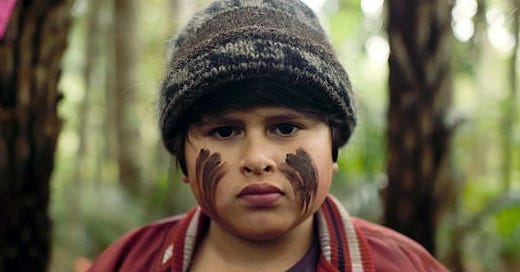Hunt for the Wilderpeople
“Hunt for the Wilderpeople” has a spring in its step. In some ways, it feels like the It natural evolution of writer / director Taika Waititi, after "Eagle v. Shark" (2009), "Boy" (2010) and "What We Do in the Shadows" (2014). He has always used quick cuts and visual diversions, sharp characters and precise humor. His movies feel personal, as if Waititi is standing in front of you doing a goofball dance, asking you to join in his journey. Join him.

“Wilderpeople” is desperately genuine as it explores the relationship between Ricky & Hec, two outcasts who find belonging in each other's company. Young, troubled Ricky (Julian Dennison) finds himself on the run in the New Zealand wilderness with his adopted uncle, Hec (Sam Neill), pursued by child protective services who want to throw him into juvenile detention.
Ricky bounced from foster home to foster home before landing with Hec. He's a 13-year old "gangster," the kind of boy who acts out because he has nobody to pay good attention to him. Dennison is a hell of a find, with a knack for comedic timing that puts him right up next to Neill. He plays "young and troubled" with the right mix of actual anger and deep, deep pain. He is an innocent. And the non-cynical, complex celebration of that innocence is what sets “Wilderpeople” apart.
We spend a lot of time talking about innocence and either celebrating or mourning the loss of it. It's easy to start and end stories with clear "before" and "after" But real innocence is a process, piecemeal, and kids go through a lot in life before they hit puberty. Capturing that worldview without demeaning it is difficult. An arsonist and a vandal, Ricky has lived a tough life. But his emotional motivations and desires, his view of the world, is fundamentally childish. He has not been beaten down like Hec — which lets Neill deliver his best performance in years, by the way.
Waititi's deft control of tone and character allow him to make Ricky a startlingly real young man. His understanding of story also allows Ricky to grow up without losing what makes him special. He changes, but not from A to B, innocent to adult; more like Ricky to Ricky, a boy whose search for a home leads him to realize he can create one.
“Gleeful.” “Goofball.” “Genuine.” A lot of positive adjectives in this review, all of which I cannot repeat enough. There is an energy to “Hunt for the Wilderpeople,” the kind that makes you walk out in a lighter mood than when you walked in. I highly recommend it.


